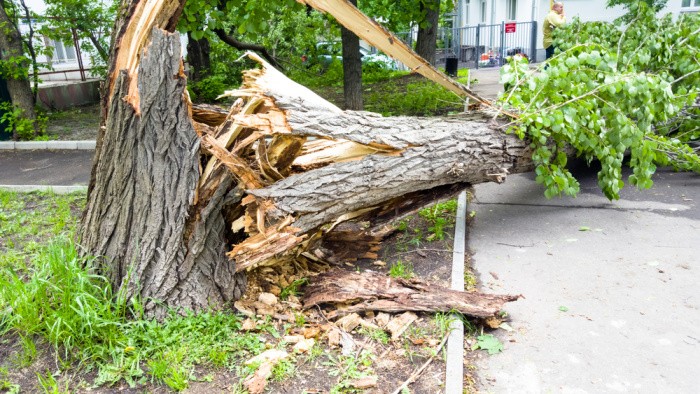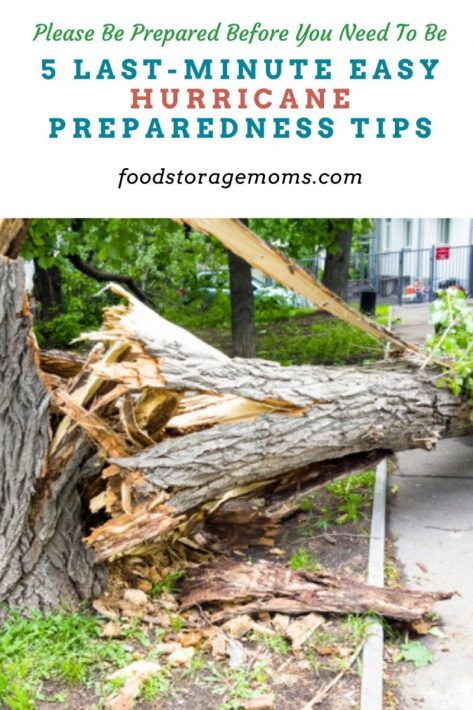
Did you know that Tampa, Florida, hasn’t seen a major hurricane in over 100 years? Hurricane Milton came close in 2024. However, that doesn’t mean they shouldn’t be prepared. As hurricane season ramps up, many people are preparing for the worst. But if you still haven’t done anything to prepare, don’t worry – there’s still time! Here are some last-minute hurricane preparedness tips to help you get ready.
Items I Recommend:

1. Have a plan for hurricane preparedness – know where you will go and what you will do if a hurricane is headed your way.
If you live in an area that is prone to hurricanes, it is essential to have a plan for what you will do if one is headed your way. The first step is to track the storm and be aware of its projected path.
If it looks like the hurricane will make landfall near your location, start making preparations. This may include securing loose outdoor items, stocking up on food and water, and filling up your car with gas. Please keep all of your vehicle gas tanks full.
If you have time, you may also want to evacuate to a safe location outside of the hurricane’s path. However, even if you don’t evacuate, it’s crucial to have a plan for where you will go if your home starts to flood or the power goes out. Knowing what you will do in advance can help to minimize the disruption and keep you safe during a hurricane. Hurricane Items You Must Have Before It Hits
2. Gather your supplies for hurricane preparedness – make sure you have enough food, water, and medicine to last at least 72 hours.
When it comes to emergency preparedness, one of the most important things you can do is gather your supplies ahead of time. That way, if disaster strikes, you’ll be ready. But what should you include in your emergency kit?
At a minimum, you’ll want enough food and water to last for 72 hours. If possible, extend that to a week or more. And don’t forget about medicine. If you or someone in your family has a chronic condition, make sure you have enough medication to last at least a few days. Beyond that, consider other items that could be useful in an emergency, such as a first-aid kit, flashlights, a good radio, and batteries.
I’ve never had to do this, but many people cover their windows with plywood or other kinds of wood boards. It helps protect the windows and you from strong winds that could blow them out. There is also the chance of flying debris that could come through the windows, so strong wood is essential.
The bottom line is this: it’s better to be safe than sorry. Take a moment now to gather your supplies and assemble an emergency kit. It could make all the difference if disaster strikes. Be Prepared for a Hurricane
3. Stay informed – keep track of the latest news and forecasts so you can make decisions based on the most accurate information.
As any prepper knows, information is power. When a hurricane is approaching, it’s essential to stay informed so you can make the best possible decisions for yourself and your family.
The most important thing is to track the latest news and forecasts. This way, you’ll know exactly where the hurricane is headed and what to expect in terms of wind speed, rainfall, and storm surge.
Armed with this knowledge, you can make a plan to evacuate if necessary or hunker down and ride out the storm. Additionally, it’s a good idea to keep an eye on social media for updates from local officials and first responders.
I think having a weather band radio is critical. You can get one that relies on batteries for power, but there are also “crank” radios. Know where it is so you don’t waste time looking for it. It’s also important to know how to operate the unit, what channels to rely on, and who to respond to based on what is reported.
I’ve also suggested to my readers that they consider having walkie-talkies so that close family and neighbors can communicate with each other. Again, know how to operate them and agree on what channels to use beforehand.
In an emergency, information can be hard to come by, but by staying informed, you can be sure that you’re making the best decisions for yourself and your loved ones. Basic Items To Gather For Any Emergency
4. Evacuate if necessary – don’t wait until the last minute to leave if officials say it’s time to go.
If you live in an area that’s prone to hurricanes, it’s essential to know what to do if a storm is headed your way. For one thing, don’t wait until the last minute to evacuate. If officials say it’s time to go, then go. The sooner you get to safety, the better.
Of course, evacuation isn’t always possible. If you can’t leave, then make sure you have a plan for weathering the storm. Have supplies on hand like food, water, and first-aid kits. And be sure to stay informed about the latest forecasts and updates from officials. 10 Things You Should Do Before You Evacuate
5. Help others – if you’re able to, offer help to those who need it during and after the storm.
If you’re able, offer help to those who need it during and after the storm. Whether it’s helping them clean up or just being a shoulder to lean on, your assistance can go a long way. If you have supplies and food to spare, consider donating them to a local shelter or relief organization.
And if you know someone who may be older or needs help, check on them to make sure they’re doing okay. We’re all in this together, so let’s help each other out! Should You Tell Others You’re Prepping? Pros & Cons
Tools You Will Need:
- Flashlights or Solar Flashlights
- Lanterns
- Lumber to board up windows
- How To Store Water For Drinking And Cooking
- Canned Foods I Highly Recommend You Store
- Water Filter
- Tools
Final Word
The next time you hear of a hurricane headed your way, there are some last-minute things you can do for hurricane preparedness. These hurricane preparedness tips can help you be prepared and stay prepared. What tips would you share with the world about preparing for a hurricane? May God bless this world, Linda
The Emergency Food Assistance Program
Copyright Images: Hurricane Broken Trees Depositphotos_176711390_S by Milanchikov
The post 5 Last-Minute Easy Hurricane Preparedness Tips appeared first on Food Storage Moms.
from Food Storage Moms
No comments:
Post a Comment